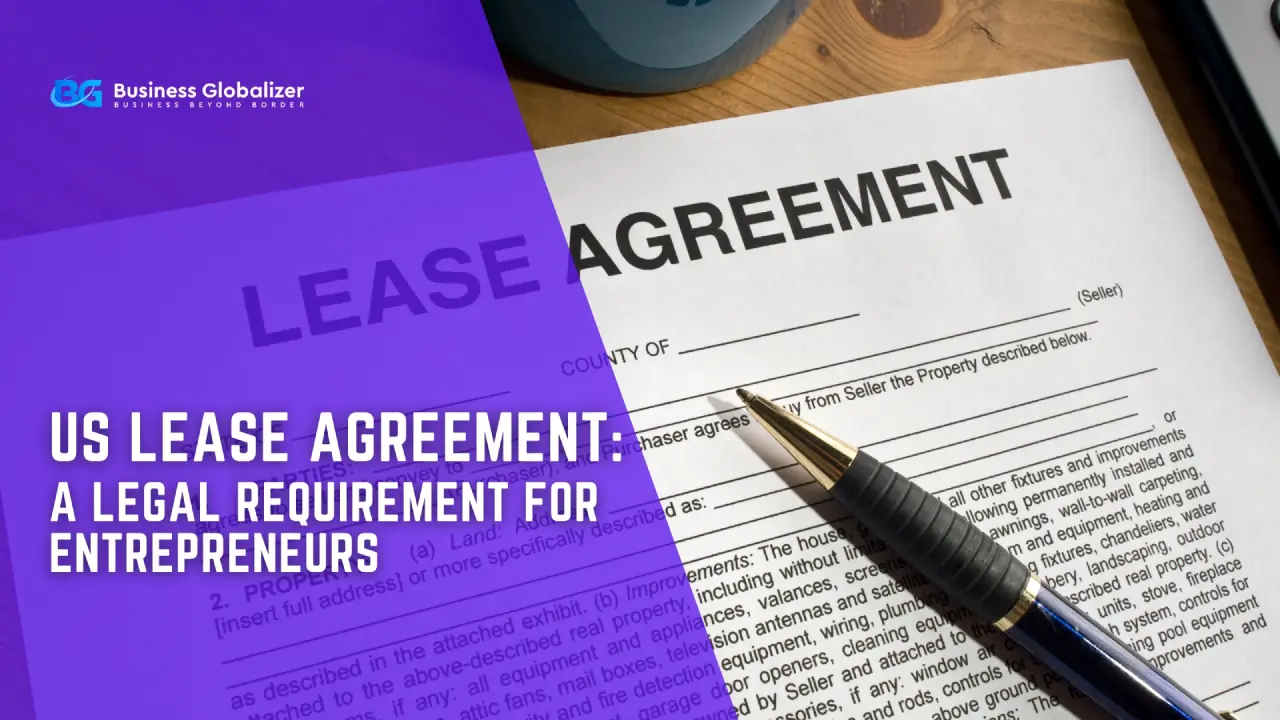Stepping into the US market? A US lease agreement could be your first handshake with success! This is more than just a document; it’s a key that unlocks doors to business opportunities and legal compliance for entrepreneurs, especially those from abroad. Whether you’re setting up a shop or securing a spot for operations—whether virtual or physical—understanding the nuances of US lease agreements is quite important.
Ready to sail over this legal landscape and lay a solid foundation for your business? This guide is for you, here we break down the what, why, and how of US lease agreements, ensuring you’re well-prepared to sign on the dotted line. Let’s embark on this journey together, ensuring you’re equipped from the get-go!
What Is a Lease Agreement?
A commercial lease or lease agreement is a legal agreement outlining the rights and responsibilities of both the landlord and tenant for a property used exclusively for business activities. It encompasses retail, office, and industrial spaces, including warehouses and mixed-use areas.
Leases are categorized into retail, for direct public sales, and non-retail, such as offices or warehouses not engaging in direct sales. This structure provides flexibility in commercial property usage while defining specific terms for various business types.
Commercial lease agreements offer more customization than other leases, allowing for specific terms like limitations on operational hours and access to certain areas, unlike standard rental agreements that typically provide unrestricted use of the property.
Why Do You Need a Lease Agreement?
A lease agreement serves as a cornerstone for establishing your business’s physical presence, crucial not only for traditional brick-and-mortar operations but also for e-commerce businesses. It acts as verifiable proof of address, a requirement for various business and legal processes, including banking, registration, and compliance activities.
In the digital age, even if your business operates online, having a lease agreement for a virtual office or a physical location lends credibility and legitimacy. This document is recognized by financial institutions, regulatory bodies, and partners, ensuring your e-commerce business meets essential operational prerequisites. Additionally, a lease agreement safeguards your rights as a tenant, outlining terms and conditions that protect both parties involved.
Types of US Lease Agreement
Entrepreneurs exploring rental spaces will encounter various lease types, each defined by the rent calculation method and expense responsibilities. Common lease agreement categories are:
- Single Net: Tenants cover rent plus property taxes.
- Double Net: Tenants are responsible for rent, insurance, and property taxes.
- Triple Net: Includes rent, insurance, property taxes, and maintenance costs.
- Full-service (Gross Lease): Tenants pay only the rent; landlords handle all other costs, offering tenants the most protection.
- Percentage: Tenants pay base rent and a sales percentage, common in retail.
Essential Elements of a Lease Agreement
Commercial leases typically detail the agreement’s specifics, including but not limited or precise to:
- Involved Parties: Provide the legal names and contact details of both the landlord (property owner) and the tenant (business entity) participating in the lease agreement.
- Commercial Property’s Details: Provide details about the leased commercial property, including its address, size in square footage, layout, and any unique features or amenities it offers.
- Agreed Rent and Payment Terms: Detail the rental amount, payment schedule (monthly, quarterly, etc.), and accepted forms of payment. Also, discuss any possible rent increases or adjustments in the future.
- Duration and Term of the Lease: Indicate the lease duration, encompassing the commencement and conclusion dates, along with any options for renewal or early termination.
- Tenant and Landlord Obligations
- Maintenance and Repair Terms: Specify the obligations of both the landlord and tenant concerning property maintenance, repairs, and upkeep. This section may also address arrangements for communal spaces and shared amenities, like parking lots or restrooms.
- Use and Restrictions: Ensure that the designated use of the commercial property is clearly outlined to match the tenant’s business operations, and detail any limitations regarding modifications, subleasing, or operational timings.
- Insurance and Liability: Discuss insurance requirements, such as liability coverage, property insurance, and any indemnification clauses to protect both parties from potential losses or damages.
- Maintenance and Repair Terms: Specify the obligations of both the landlord and tenant concerning property maintenance, repairs, and upkeep. This section may also address arrangements for communal spaces and shared amenities, like parking lots or restrooms.
- Security Deposit: Outline the security deposit amount, its intended use, and the terms for its refund upon lease termination.
- Lease Renewal and Termination: Outline the terms and processes regarding lease termination, encompassing notice periods, contract breaches, and possibilities for renewal or extension.
- Governing Law and Dispute Resolution: Specify the governing law for the lease agreement and detail the procedures for resolving disputes.
- Additional Terms and Conditions
Furthermore, they often outline the responsibilities and expenses related to property fit-outs, with some requiring tenants to cover costs like rates, taxes, utilities, and other outgoings.

Lease Agreement as Proof of Address
A lease agreement plays a crucial role beyond defining the terms of a property rental; it also serves as an essential proof of address for businesses. Especially vital for e-commerce operations, this document validates your business location for regulatory, financial, and supplier engagements. It’s not just about securing a spot for your operations; it’s about establishing your business’s legitimacy. Whether it’s opening a bank account, complying with local laws, or setting up utility services, a lease agreement affirms your physical presence in the business world.
For virtual offices, a lease agreement offers a tangible address to anchor your digital enterprise, ensuring your business meets the necessary legal and operational standards.
Why Do You Need a Lease Agreement as Proof of Address?
The reason why you need a lease agreement as proof of address is briefly discussed below:
- Establishes Legitimacy: A lease agreement validates your business location for regulatory purposes, demonstrating your physical presence in the business world. This is crucial for interactions with financial institutions, suppliers, and legal entities.
- Facilitates Business Operations: Having a physical address on a lease agreement allows you to open bank accounts, comply with local laws and regulations (such as zoning or licensing requirements), and set up essential utilities for your business operations.
- Virtual Offices: Even for virtual offices, a lease agreement provides a tangible address to anchor your digital enterprise. This ensures your business meets necessary legal and operational standards.
In a nutshell, a lease agreement is a foundation document for establishing your business’s legitimacy and facilitating essential operations, both in the physical and virtual world.
Requirements for a Lease Agreement
Securing a commercial lease agreement requires specific documentation to formalize your business’s occupancy. Primarily, you’ll need to provide comprehensive company details, including an article of organization, which outlines your business structure and legitimizes its existence.
Additionally, landlords may request proof of business registration, identification for all major stakeholders, and financial records to assess your business’s stability and reliability. This preparatory work ensures that both parties enter the lease agreement with a clear understanding of the business’s credentials and intentions.
Lease Agreement for Business
A lease agreement is essential for businesses, especially when setting up a virtual office. This setup involves using a real, physical address as your business’s mailing and official address. Such an address is crucial for handling emails, notices, and parcels from around the globe, or even for regulatory inspections. This address not only adds credibility to your business but also complies with legal requirements for operating in certain jurisdictions. To secure a virtual office and its benefits, obtaining a lease agreement that outlines the terms of use for the address is a necessary step. This agreement legitimizes your business’s presence and operations, making it an important part of your business foundation.
Differences Between Commercial and Residential Leases
At this point, you may wonder, “What are the differences between commercial and residential agreements?” While both serve as contracts between a landlord and tenant, key differences set them apart, affecting everything from the level of commitment to the specifics of the agreement. Let’s take a look below:
More Restrictive Arrangements
Commercial leases have stricter covenants than residential leases, dictating parking, signage, and business hours. They clearly outline the leased space and its permissible uses.
Availability of Customization
Commercial leases are tailored to each tenant, covering specifics like insurance, maintenance, customization costs, rent changes, and termination terms. This requires detailed negotiations to align with both tenant and landlord needs.
Enhanced Tenant Commitment
Given their complexity and longer terms, commercial leases demand a significant tenant commitment, with landlords often investing in property adjustments. Despite fewer tenant protections, a well-negotiated lease can beneficially anchor a new business.
Where and How Do I Create My Lease Agreement Properly?
Crafting a precise and legally binding lease agreement for your business’s virtual office is crucial, and that’s where Business Globalizer excels. With our deep expertise in drafting commercial lease agreements, we ensure every document is tailored to meet your specific needs while complying with legal standards. Our dedicated service focuses exclusively on creating lease agreements that safeguard your interests and facilitate your business operations. Trust in Business Globalizer’s professionalism and experience to provide you with a lease agreement that stands solid in legality and functionality. Let us handle the intricacies, so you can focus on growing your business with peace of mind.
FAQ
Q1: Why Do Entrepreneurs Need a US Lease Agreement?
Answer: A US lease agreement is crucial for entrepreneurs as it legally secures their right to use a property for business operations. It serves as proof of address for regulatory, banking, and supplier purposes, establishing the business’s legitimacy.
Q2: What Is Required in a Lease Agreement?
Answer: Rent information, lease duration, security deposit, maintenance obligations, and usage regulations should all be included in a comprehensive lease agreement.
Q3: Is There a Difference Between a Lease And A Rental Agreement?
Answer: Yes, there are differences between lease and rental agreements. A lease agreement typically has a fixed term (e.g., 12 months) and provides more stability, whereas a rental agreement is more flexible and is usually renewed month to month.
Q4: Can I Use a Lease Agreement to Get a Virtual Office Address?
Answer: Yes, you can use a lease agreement to obtain a virtual office address. This provides a physical location for your business, necessary for receiving mail, legal documents, and fulfilling regulatory requirements.
Q5: What Documentation Is Required For a Commercial Lease Agreement?
Answer: Securing a commercial lease typically requires your company details, such as an Article of Organization, financial statements to demonstrate stability, a business plan, etc. which can vary.
Q6: How Does a Lease Agreement Benefit My E-Commerce Business?
Answer: For e-commerce businesses, a lease agreement offers a verifiable physical address essential for opening bank accounts, receiving mail, and establishing credibility with customers and suppliers.
Q7: Can I Alter the Terms of a Lease Agreement?
Answer: Yes, lease agreements can be customized to include specific terms agreed upon by both the landlord and the tenant, as long as they follow local laws.
Q8: Can I Draft My Own Lease Agreement?
Answer: If your landlord is reliable, you can draft your own lease agreement. But there are a lot of rules to follow. You have to make sure that there are no unlawful clauses in the lease. If any condition is illegal, the agreement must state that the rest of the terms remain in effect. After you have written your lease, you should have it reviewed by an expert. They will be able to identify any illegal or unenforceable conditions that could result in legal issues.
Q9: How Long Should You Keep Lease Agreements?
Answer: After a tenant vacates the property, the lease agreement must be maintained for a minimum of six to seven years. This is because disputes with tenants or the IRS can arise many years after a lease expires. It is always better to be prepared. If the IRS believes you have not accurately reported your income, they may challenge your tax returns. Also, a tenant from the past could file a lawsuit for violating the lease. In these situations, having proof of the lease agreement will be critical in court. When discarding old agreements, always shred them to ensure that no one has access to your financial information.
Q10: How Much Does a Lease Agreement Cost In The US?
Answer: Typically, it costs between $400 and $650. The cost varies from state to state.
Q11: Who Is Responsible for Paying Taxes Under a Lease Agreement?
Answer: The person who pays the tax is determined by the type of tax mentioned in the lease agreement. Property taxes are typically the responsibility of the tenant or lessee, and income taxes on the rental income from the property are the responsibility of the landlord or lessor. However, this can change based on the terms of the lease and the particular tax regulations in the area in question.
Final Words
Securing a US lease agreement marks a vital step for entrepreneurs entering the American market. It’s not just about legal compliance; it’s about setting a solid foundation for your business’s growth. Whether you opt for a physical space or a virtual office, understanding and negotiating your lease is key to your success.
With careful consideration and expert support like Business Globalizer, you can ensure that your lease agreement aligns with your business goals and offers the protection you need. Let this be your starting point towards a thriving business venture in the US.






